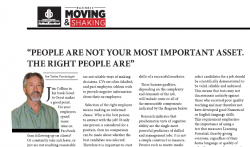"People are not your most important asset. The right people are"- Jon Taylor2014-12-17 "People are not your most important asset. The right people are"
2014-09-02 "People are not your most important asset. The right people are" Jim Collins in his book Good to Great makes a good point. Do your employees spend more time on Facebook than following up on clients? Or constantly take sick leave, or just are not reaching reasonable performance targets? Maybe you need to be more systematic in selecting the right people. Carefully selected employees are an investment in the skills, values and strategic-thinking required for your organization's profitability and future growth. Selection of staff may be seen as a luxury or unnecessary expense or waste of time. Managers often feel they can make correct selection decisions based on their intuition after checking out the CV and interviewing the candidate. Although the chemistry of the manager and the potential employee is important, research shows that interviews alone are not reliable ways of making decisions. CVs are often falsified, and past employers seldom wish to provide negative information about their ex-employees. Selection of the right employee means making an informed choice. Who is the best person to entrust with the job? If only one person is considered for a position, then no comparison can be made about whether the best candidate was selected. Therefore it is important to start by throwing your net widely to recruit a number of potentially good applicants, and then start a systematic short listing process. In making an objective decision about which candidate to select, you will need to start with clearly identified core job activities - what are the key activities that the potential employee must be able to do. These job dimensions will be analysed by a psychologist to determine the most important and measurable human qualities or competencies that contribute to success in each job. The competencies of a good engineer are vastly different from the skills of a successful marketer. These human qualities, depending on the complexity and demands of the job, will include some or all of the measurable components indicated by the diagram below. Research indicates that psychometric tests of cognitive ability are the single most powerful predictors of skilled and management jobs. It is not a simple construct to measure. Proxies such as matric marks and even tertiary qualifications are also open to interpretation since standards vary widely. So how can we assess the underlying cognitive potential of a number of applicants who have not all had access to good schooling or the opportunity to gain relevant experience? Assessing Learning Potential is a viable means of answering this question. Assessing competencies that are developed with practice (e.g. numerical or verbal ability) may be considered if these are inherent requirements for the job. However, the Employment Equity Act stipulates that any assessment method used to select candidates for a job should be scientifically demonstrated to be valid, reliable and unbiased. This means that tests may not discriminate unfairly against those who received poor quality teaching and may therefore not have developed good Numerical or English language skills. This requirement emphasizes the importance of using a test that measures Learning Potential, thereby giving everyone, regardless of their home language or quality of schooling, an equal opportunity of demonstrating their potential to learn. New recruits and also existing employees will be required to master new technology and processes and build specific organizational knowledge, therefore the ability to learn is an important element of successful performance in all jobs. Leadership and Interpersonal Capabilities Using psychometric tests to assess intangible job dimensions such as leadership and strategic thinking is a challenge. Such Questionnaires are based on the subjective responses of candidates and require honest and insightful responses. These dimensions can change - for example a very extroverted confident person is likely to become introverted and apprehensive if they have recently experienced a traumatic accident or loss of family or a health threat. Such self-rating questionnaires should be validated by an experienced interviewer to corroborate that the self-ratings can be triangulated with reality. Progressive organizations make the selection of staff a high strategic priority. Companies such as SAB Miller attribute much of their spectacular growth to the time and effort spent in finding the right people for each job. This has provided them with a pipeline of highly talented staff within the company, who have demonstrably been able to rise to new growth challenges. The right people are your best assets. Jon Taylor Psychologist Assessment & Development Services jon@adsteam.co.za www.adsteam.co.za |
"People are not your most important asset. The right people are"- Jon Taylor
Copyright © 2024 KwaZulu-Natal Top Business
